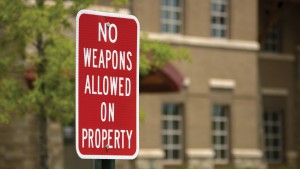Campus Carry Law: the Logic of Allowing Guns on Campus
In the United States, four of the 50 states have a campus carry law that allows a licensed gun owner to carry their personal firearm while on a public school campus.
Advocates of a campus carry law state that self-defense is a human right. To the advocates, if they were confronted with the gunman off-campus, they would have the right to defend themselves with deadly force. So when they face a gunman on a university campus, they should have the same right to defend themselves.
But are we comfortable with a student, or a person on campus, carrying a concealed firearm? What is a campus carry law? How do you get a license to carry a concealed weapon? Does the campus carry law help or create more issues?
What is a Campus Carry Law?
A campus carry law authorizes licensed gun owners to carry a concealed handgun on university campuses in the state. A CCL allows universities to enact “reasonable rules and regulations” for their campus.
In Texas, CCL states that:
- There are no open carry on campus
- Every gun holder must have a license to carry
- To have a license to carry, the person must be at least 21 years-old.
- It is still a crime for a licensed gun owner to carry a concealed handgun while intoxicated.
In Texas, the gun owner must be 18 years or older and have a valid I.D. to own firearms like rifles or shotguns. You must be 21 years or older with a valid I.D. to own a handgun. But to have a concealed handgun, the gun owner must ask for a license to carry.
How Do You Get a License to Carry a Concealed Handgun?
Concealed weapons law varies from state to state. In Texas, they apply a shall-issue approach to grant a concealed weapons license. Shall-issue grants licenses to conceal so long as the applicant follows the requirements of the law. In contrast, states like California and New York have a “may-issue” approach, which also requires the applicant to show good cause. 
This means that a sheriff or a local authority cannot deny a license to carry, even if they know of any reason why the particular applicant should not have one. If the police know an individual who is prone to be violent or prone to fits of passion, he may be granted a license to carry a concealed weapon.
The existence of a campus carry law and a concealed weapons law, together, is troublesome.
Does Allowing Students to Arm Themselves Help Prevent School Shootings?
There have been 277 shootings since the Columbine High School massacre in 1999. So the idea of allowing students to carry concealed firearms is disquieting. The nation can agree that we want to stop school shootings, but we cannot agree on how to stop them.
Every shooter has a name and story, but they are all labeled as unstable, psychotic, or evil. They all found access to firearms and carefully, deliberately planned their attacks. So the ultimate question is: how can we end school shootings?
Do we ban guns from society or do we allow individual citizens to arm themselves and fight back? There are many recorded instances where armed civilians stopped a gunman before their plan could be carried out. It is without question that these brave individuals saved the lives of others and at great personal risk.
A Campus Carry Law Does Not Fix Our Problem.
It’s true, guns don’t kill people; it is people with guns.
But the reason these shooters caused destruction is due to two things: mental instability and access to firearms. In a state like Texas, an applicant’s mental health is not questioned until it is far too late. We do not want to stigmatize and isolate individuals with mental illness as a threat to society. We also do not want to stigmatize and isolate gun owners as a threat to society.
A mentally ill person is often only a threat to themselves if you remove access to a lethal weapon. But a gun owner, whether they struggle with mental illness, can still be a threat. If a gun owner perceives a threat which doesn’t actually exist, or if the gun accidently discharges, then there is a very real risk that someone will be injured or even killed.
The reality is that we live in a society that was built on the use of firearms not only to defend, but to provide. Most of us do not rely on hunting for food. But today, Americans that live in poverty and rural areas rely on firearms and weapons to feed their families.
We also live in a society where $38.3 billion was spent on hunting gear and supplies in 2011. In comparison, it generated more revenue than Google did in the same year. Hunters and fishermen have spent $7.2 billion annually on permits and licenses. The money is used to preserve our national parks and wildlife.
We live in a society that enjoys the civilian use of firearms. But it does not mean we should accept a society with mass shootings. In America, over 80% of the firearms used in mass shootings were obtained legally.
If we cannot live in a society without guns, then we must be more strict and stringent to prevent firearms from falling into the wrong hands.

Comments